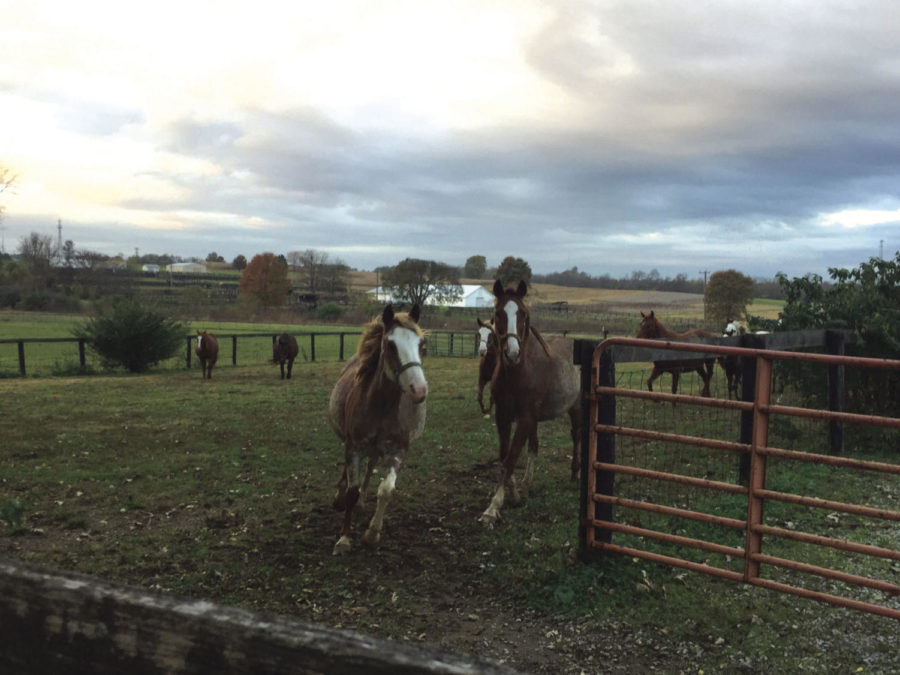UK’s Gluck equine center has historic herds, history-making research
The Maxwell H. Gluck Equine research center in the department of veterinary science is located on south campus.
December 7, 2017
As a unique scientific research institution, the Maxwell H. Gluck Equine Research Center in the Department of Veterinary Science stands as a shining point of UK’s College of Agriculture, Food and Environment.
Built in 1987, the institution was named after the late Maxwell H. Gluck, owner of Lexington’s Elmendorf Farm. Gluck and his wife donated $3 million toward construction on the condition that both the state and members of the horse industry individually match the donation. The 81,000 square foot facility stands on south campus, but the true marvel is the work that it houses.
The Gluck Research Center has 19 faculty members and is the one of the very few scientific research institutions in the world and the only one in America with almost all faculty conducting full-time research toward equine health and well-being.
Covering areas of genetics and genomics, immunology, infectious diseases, parasitology, pharmacology, therapeutics and toxicology, musculoskeletal science, and reproductive health, the institution has 300 horses in the department for research. With excellent technical facilities and distinguished expertise, this institution excels in all fields.
Yet some of these herds are far from common. The parasitology departmental section is home to the “historic herds,” established by Eugene Lyons, who has worked with the Gluck Research Center for more than 50 years.
He established the herds four decades ago for research specifically in parasites infecting horses. These herds are naturally infected by a wide range of parasites, but are remarkably healthy, on par with commonly de-wormed horses.
“You don’t find herds like this anywhere else in the world,” said Dr. Martin Nielson, parasitologist and associate professor.
Nielsen has undertaken funding initiatives to sustain these herds, and started the #HistoricHerds tag on Twitter to increase awareness.
“We are seeking support to sustain these herds, as state and federal funding sources are diminishing every year,” Nielsen said.
The researchers work closely with the herd on a regular basis. A common favorite is a well-behaved paint Tennessee Walker stallion called “Penguin,” donated to the herd in recent years.
By collecting fecal samples from mares, foals and stallions from the herd, research professors and UK students are able to use the samples to develop new diagnostics and to study drug resistance and treatment modalities in the animals.
“Every week we ship samples off to other institutions,” Nielsen said.
He said the center has collaborations with the University of Massachusetts, University of Calgary, and University of Colorado-Denver, as well as several international research groups.
“Recently, we have been part of mapping out the entire genome of a common horse parasite, the equine large roundworm,” he said.
“Everything that we do is done in the name of equine health,” Lyons said. “The research crosses over to other species as well. For example, the first findings of drug resistant parasites were made in sheep, but the same types of resistance were then soon thereafter found in horse parasites as well.”
One of the most prominent features of the research program is the opportunity for students to participate and train in a research environment. Sixth-year PhD student Jennifer Bellaw was Nielsen’s first student and employee and has worked with him ever since. She helps at the research farm three to four times a week.
“Parasitology is the main interest for me more than the horses, but I love coming out to the farm and doing visits,” Bellaw said.
One highlight of her career was made available recently through her credentials from Gluck, when she was able to work with the University of Calgary and University of Saskatchewan in Canada to do research on the feral horses of Sable Island just off of Nova Scotia.
“We are able to provide a unique learning environment not only for the students, but everyone involved,” said Nielsen. “We are able to collaborate with researchers in both medical and other species fields, while still maintaining a distinct focus on the horse.”
With their devotion to the betterment of equine health, unique research resources, and ability for students to participate in research, the Gluck Equine Research Center continues to be a leader in improving equine well-being and student opportunity at UK.




























































































































































